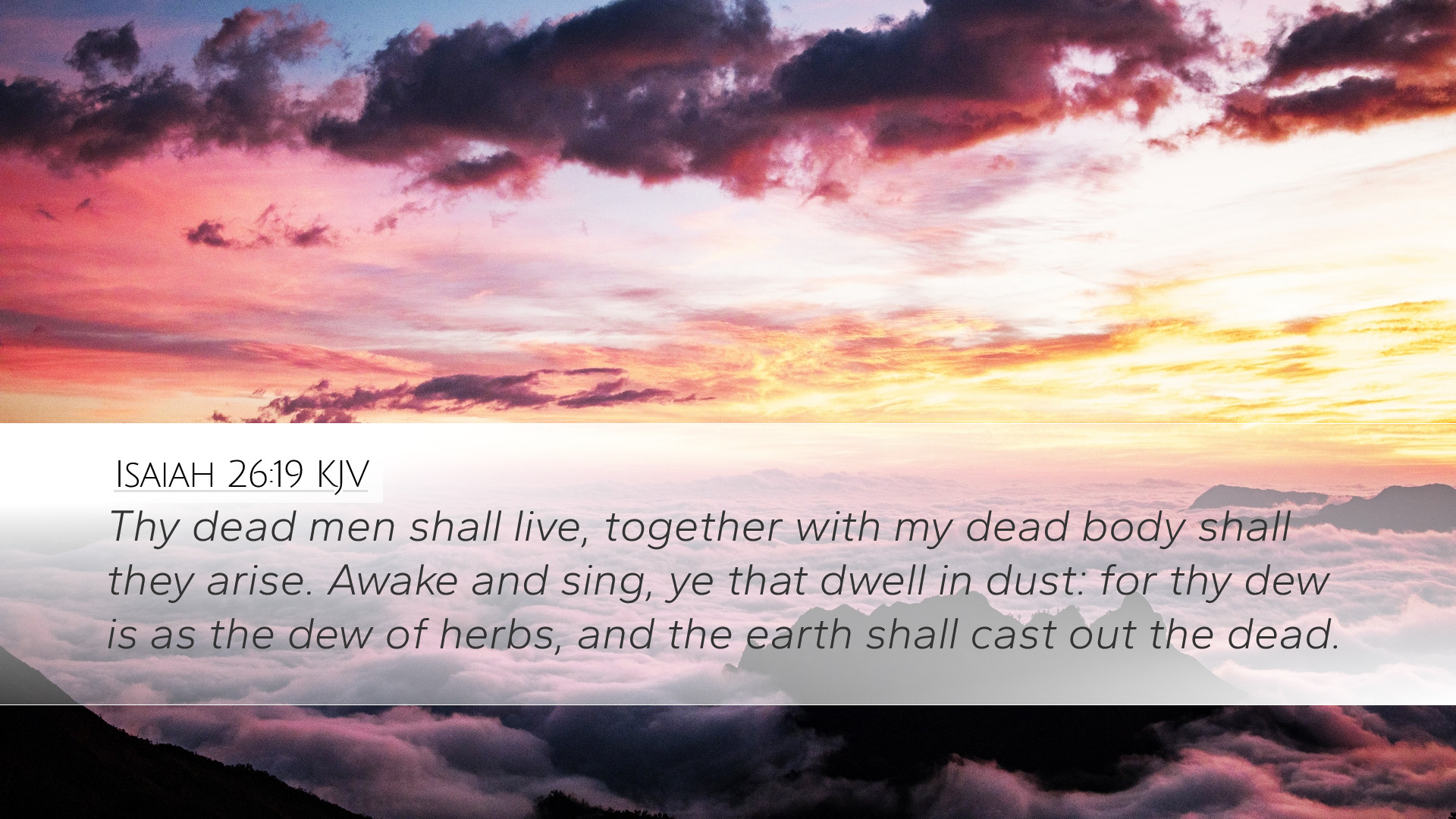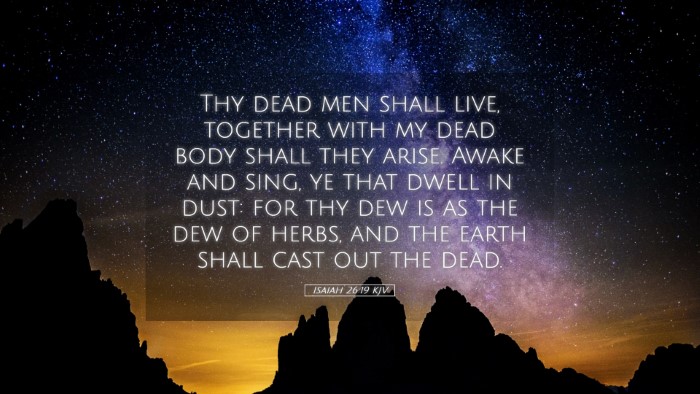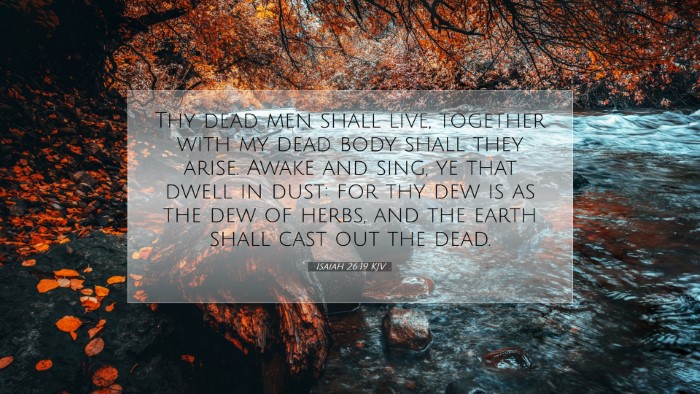Commentary on Isaiah 26:19
Verse Text: "Thy dead men shall live, together with my dead body shall they arise. Awake and sing, ye that dwell in dust: for thy dew is as the dew of herbs, and the earth shall cast out the dead." (Isaiah 26:19, KJV)
Introduction
Isaiah 26:19 is a profound verse that provides a glimpse into the hope of resurrection and eternal life. This verse is often cited in discussions about the afterlife, the resurrection of the dead, and God's promise of restoration to His people. The commentators provide rich insights into the theological implications and the historical context surrounding the text.
Theological Insights
This verse encompasses significant theological concepts, especially regarding resurrection. Both Matthew Henry and Albert Barnes offer detailed insights into the eschatological implications of the phrase "Thy dead men shall live." This indicates not only physical resurrection but also spiritual revitalization. Adam Clarke emphasizes that the imagery used in this verse alludes to a powerful promise — that death is not the end but a transition to renewed life.
The Promise of Resurrection
The phrase "Thy dead men shall live" transcends mere physicality; it denotes God's authority over life and death. Matthew Henry notes that this promise is fundamentally tied to faith in God. The resurrection becomes a source of hope through the expected transformation and the victory over death.
The Collective Nature
Commentators emphasize the collective aspect of resurrection as highlighted in the phrase "together with my dead body." This suggests unity among believers. Albert Barnes points out that Isaiah may be speaking of a collective resurrection where all of God's people, the righteous throughout history, will be raised to life. Adam Clarke adds that this unity serves to bolster the assurance of individual believers regarding their resurrection hope.
Awake and Sing
The call to "Awake and sing, ye that dwell in dust" is both a summons for rejoicing and a declaration of hope. Matthew Henry explains that this invitation is directed towards the faithful, encouraging them to rejoice in the promises of God. The imagery of dust signifies mortality and the frail condition of humanity, yet it is juxtaposed with the promise of revival and renewed life through God's intervention.
Imagery and Comparisons
This verse employs rich imagery that speaks to the understanding of life and death. The phrase, "for thy dew is as the dew of herbs," conveys a sense of fertility and revival. In ancient agrarian cultures, dew represented sustenance and growth. Albert Barnes highlights how dew is essential for life, drawing a parallel between divine providence and the spiritual sustenance provided by God in the resurrection.
The Earth Shall Cast Out the Dead
Furthermore, the concluding statement, "and the earth shall cast out the dead," indicates an active role of creation in God's resurrection plan. Adam Clarke emphasizes that this portrays a powerful image of revitalization—the earth, which often symbolizes life and fertility, is envisioned as releasing those who have died. This aligns with the biblical theme of restoration woven throughout scripture, reinforcing God's sovereignty in all creation.
Contextual Considerations
Understanding the historical and cultural context of Isaiah 26 is essential for grasping the weight of this verse. Isaiah delivers this prophecy during a time of turmoil and uncertainty for the people of Israel. This prophetic word serves as a beacon of encouragement amidst despair. Matthew Henry notes that the faithful were often subjected to trials, yet God's promise to resurrect reinforces their faith and hope.
Israel's Hope in Exile
During Isaiah's time, exiled Israelites faced oppression and loss. However, this passage asserts that God would not abandon His people. Albert Barnes expands on this by noting that the resurrection theme offers profound hope not just for individual believers but also for a collective restoration of the people of Israel after their trials. It emphasizes God's unwavering commitment to His covenant promises.
Applications for Believers
Isaiah 26:19 speaks volumes to contemporary believers. It encourages the congregation of Christ to hold fast to the hope of resurrection, especially in the face of personal or communal struggles. The truth that "Thy dead men shall live" is a comfort to those mourning the loss of loved ones and serves as a reminder of the eternal promises of God.
Encouragement in Trials
Pastors can utilize this verse to provide comfort and hope during funerals or times of grief, reflecting on the assurances that God provides through resurrection. The contextual emphasis on hope during despair is critical; believers are reminded that, even in the depths of hardship, there is a promise of renewed life and joy to come.
The Call to Worship
The exhortation to "Awake and sing" serves as a call to worship and celebration of God's faithfulness. Church leaders should encourage congregations to embrace and reflect on this promise in their worship, affirming the community's belief in the resurrection power of Christ.
Conclusion
Isaiah 26:19 encapsulates profound truths regarding resurrection, hope, and divine providence. Insights from Matthew Henry, Albert Barnes, and Adam Clarke provide a rich commentary on this verse. For pastors, students, and theologians, these reflections serve as a reminder of the significance of resurrection in the Christian faith and the unwavering hope offered through God's promises. This verse not only encourages believers to look forward to the eternal joys of life after death but also calls them to actively participate in the present reality of worship and faith in God's restorative power.


